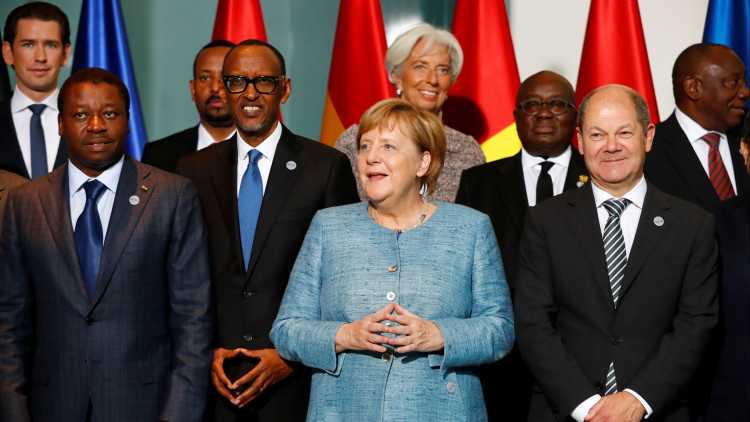- Home
- Publications
- GIGA Focus
- The G20 Compact with Africa: An Incomplete Initiative
GIGA Focus Africa
The G20 Compact with Africa: An Incomplete Initiative
Number 2 | 2017 | ISSN: 1862-3603

A key element of the G20’s partnership with Africa is the Compact with Africa (CWA) initiative, the primary aim of which is to support private and infrastructure investment. Draft compacts of five African countries – Côte d’Ivoire, Morocco, Rwanda, Senegal, and Tunisia – may be presented at the G20 Africa Partnership Conference in Berlin.
The CWA initiative cannot and should not be seen as a quick fix vis-à-vis the root causes of flight and migration. It might support development in Africa, but alone it will not be decisive. The initiative addresses a key mechanism of economic (under)development, but the coordination problem that explains Africa’s low income levels extends well beyond the realm of investment and infrastructure. An investment plan that fails to recognise this is bound to fail.
The CWA omits four very important issues. First, it ignores investment in education, which is an essential complement to physical infrastructure and private investment. Second, it fails to discuss the G20’s responsibility in creating an uncertain trade and investment policy environment that harms investment in Africa. Third, while the compact has much to say on investor risk, it does not address the social and environmental risks associated with private investment. Fourth, the CWA fails to take seriously a comprehensive sustainable development agenda, as implied by the 2030 Agenda.
The CWA does better in a technical sense and proposes a number of instruments that aim to achieve a better-matched supply of capital and to facilitate better preparation of investment projects. However, the priority seems to be de-risking through subsidies, which may waste resources or induce excessive risk-taking. Other instruments and domestic financial markets may be better at leveraging private investment for small, highly profitable, and highly risky African projects.
Policy Implications
Support to Africa can only succeed as a long-term endeavour. The CWA initiative needs to be more comprehensive; this can be achieved by linking it to country development strategies based on the 2030 Agenda. Investment in education should be an integral part of the compacts. The G20 should commit to a predictable trade regime for Africa. Investors, multilateral development banks, and host countries need to address potentially adverse ecological and socio-economic effects of private investment by adhering to adequate international standards and by effectively implementing safeguards.
The Proposed G20 Compact with Africa Initiative
The G20 Compact with Africa (CWA) initiative, under the G20 Finance Track, aims to support private investment flows and the provision of infrastructure in Africa (AfDB, IMF, and WBG 2017). At the core of the initiative proposed by the German presidency are country-specific investment compacts prepared by African governments, international organisations, and bilateral partners with the main objective of encouraging private-sector investment. The finance ministers of five African countries (Côte d’Ivoire, Morocco, Rwanda, Senegal, and Tunisia) attended the G20 finance ministers’ meeting in Baden-Baden to signal their willingness to work on such compacts.
These compacts are meant to mobilise governments and international partners to implement concrete measures to boost investment in Africa. According to a report that the AfDB, IMF, and WBG (2017) presented at the above-mentioned finance ministers’ meeting (also referred to below as the Baden-Baden document), the CWA initiative has three building blocks: (i) the macroeconomic framework, (ii) the business framework, and (iii) the financing framework. The macroeconomic framework stresses resilient macroeconomic policies with a focus on debt sustainability, investor-friendly domestic revenue mobilisation, and sound public investment management. The business framework highlights the reduction of risk through more reliable institutions and regulation, investor protection, insurance against political risk, better project preparation and standardised contracts. The financing framework emphasises reducing the costs and risks of providing financing, particularly through efficient risk-mitigation instruments and domestic improvements in the areas of debt and institutional investor finance. Further, restrictions on international investments in Africa, particular those on institutional investors, ought to be loosened.
I argue below that the CWA initiative cannot and should not be seen as a quick fix vis-à-vis the causes of flight and migration and underdevelopment. In order to succeed, the initiative requires stamina and must be made more comprehensive. I outline a number of important omissions of the CWA that need to be addressed. Further, the instruments currently proposed in the Baden-Baden document may not be sufficient to effectively increase investment. I conclude with some recommendations that would help to turn the initiative into a compact for sustainable investment in Africa.
An Aid-Based Investment Compact Alone Cannot Fix the Problem
It is important to understand that the main reason why Africa is receiving so much attention from the G20 under the German presidency is the current political context in Europe, with immigration at the centre of the political discourse. Combating causes of flight and migration has become the elephant in the room in discussions about economic development in Africa. Politicians have explicitly linked migration and the CWA (see, for example, BMF 2016). Overall, I was happy to hear at the occasion of the opening ceremony of the German G20 presidency in Berlin in December 2016 the German finance minister, Wolfgang Schäuble, talking at length about African development. In his speech at the G20 opening ceremony in Berlin, however, Mr. Schäuble referred to the initiative as a “Compact for Africa” – a statement that was corrected in later communication by the ministry. I do not want to overstress the linguistic nuances, but this detail is exemplary of a mindset that is dominated by the view that “we” can fix the problem through better-coordinated and investment-focused aid.
The challenge to be addressed requires firm long-term commitment going way beyond political cycles and way beyond aid and a narrow investment compact. The transformative change that will have to occur in many parts of Africa to close the vast income gaps between Africa and Europe will run over a course of decades. To illustrate the order of magnitude of the income differences: Closing average income gaps between a poor West African country with a per capita income of USD 600 per year today and European levels (of USD 30,000–40,000 per year) will require annual per capita income growth rates close to 10 per cent continuously for the next 40 years (assuming that European incomes do not grow much further). This is not to say that an equalisation of per capita incomes can or should be a meaningful medium-term goal. Yet, change and transformation – at a pace unprecedented in Africa – is required to address the massive social challenges of most of the continent’s countries, including particularly the creation of millions of decent jobs in higher-productivity activities.
While aid and cooperation, such as the CWA, can bolster this transformation, it alone will not be decisive. This holds even if aid is better coordinated and thus more effective, and even if it is successful in mobilising private initiatives. As the report by the AfDB, IMF, and WBG (2017) correctly acknowledged (and documented impressively in a large appendix), there has not been a dearth of initiatives towards Africa by international organisations and donors. However, even combined, these initiatives have not had the transformative effect that was hoped for. But will the CWA initiative be able to change that?
A key assumption of the CWA approach is that the lack of public and, more so, private investment is rooted in a coordination problem. This idea has been advocated by, among others, Paul Collier, a professor at Oxford University and a prominent voice in development policy, who is explicitly mentioned in the Baden-Baden report. Collier (e.g., in Collier 2013) has argued that small markets in small, poor, isolated economies typically prevent scale economies and hamper competition. This, together with high transport costs caused by poor infrastructure, makes essential inputs prohibitively costly. To overcome this coordination problem, pioneering investment is needed, which cannot occur without public intervention in terms of improving infrastructure, subsidising investment, providing political risk insurance, and fostering long-term public–private partnerships. This pioneering investment – triggered by the support of a country-level compact and with foreign support – can then set in motion a virtuous circle of further investment, so the argument goes.
This stylised notion of virtuous investment circles does highlight a key mechanism of economic (under)development, which means that the CWA initiative has the right focus. However, the coordination problem that explains Africa’s low income levels extends well beyond the realm of investment and infrastructure – it includes other key dimensions of economic development that directly matter for investment and growth. These include the role and functioning of the state, the mobilisation of both public and private domestic resources, and the modalities of both integrating into the world economy and education. Coordination is complicated by the fact that all of these spheres – notably the economic, political, and social – are closely intertwined, and well-functioning institutions are required to coordinate them. In fact, this is why economic development is, in essence, a coordination problem. For example, a malfunctioning state does not provide public goods, such as schools and roads, in sufficient quantity and quality. Consequently, its citizens are not willing to pay taxes, which implies that the state does not have enough resources and that politicians are not held accountable – perpetuating a dysfunctional state. Such a state is then not in the position to provide an adequate environment for private investment.
This may sound abstract, but an investment initiative that does not acknowledge these interlinkages is bound to fail. The CWA initiative, at least the AfDB–IMF–WBG framework paper that is available today, considers only a subset of important interlinkages. In terms of state capacity, it emphasises sound public management and the need for improved performance on the part of public utilities. In addition, it comprises a detailed section on domestic revenue mobilisation and recommends tax reform to increase tax intake. Further, the CWA framework document highlights the importance of improving the business climate through better and more reliable regulations and institutions, and contains a long section on investor protection and dispute resolution. Despite its detail in these regards, the CWA initiative remains partial and incomplete in other key matters.
Why (and Where) the Compact Initiative Is Incomplete
Assuming that policy makers do not see (and do not sell) the CWA as a panacea for Africa’s problems, the CWA can potentially add value to international efforts by better coordinating existing programmes at the country level. Its focus on investment is appropriate, and so is its emphasis on state capacity as a potentially important component of country-specific compacts.
Yet, the compacts can be successful in mobilising investment for development only if they relate meaningfully to more comprehensive development agendas, most notably the 2030 Agenda for Sustainable Development. Failure to do so would deprive the compacts of a shared normative basis. Without losing focus, it is possible and necessary for an investment compact to acknowledge and build in, for example, the interlinkages between investment and education. Thus, in my view, four very important issue areas have been omitted in the Baden-Baden document. The first is the quality of education, the second is issues related to the integration of Africa into the world economy. Third, the report does not at all mention the risks associated with private investment – not the risks for investors, stressed heavily in the CWA, but for the African countries where investment takes place and for their residents. Fourth, in relation to all three previous points, the CWA is too narrow and fails to demonstrate a comprehensive understanding of development as defined by the 2030 Agenda and the African Union’s Agenda 2063.
In my view, the lack of quality education in large parts of Africa, with many children finishing school being hardly able to read and write, seriously threatens any sustained economic progress. In its few references to education, the document also reduces the role of the state to providing for “basic education.” Africa will need engineers to build and run quality infrastructure. Any hope of technological leapfrogging and harnessing the potential of new technologies rests on the capacity to adopt them. Africa urgently needs better schools and universities, and an investment compact must not overlook this crucial topic. There have been considerable achievements in school enrolment; today approximately 80 per cent of African children go to primary school, up from only 60 per cent in 2000 (primary net enrolment, UN 2015). However, the skills acquired in schools are all too often deficient. A recent study on learning achievement in West Africa showed that more than two-thirds of children who have completed primary school lack sufficient competency in mathematics and reading. The results are even worse for the poorest children (Kattan 2017).
While education falls largely into African countries’ potential policy commitments, quite a few potential partner countries’ commitments come to my mind in the context of the international trade and investment regime. We should not forget that the compacts are being discussed in the G20 context, currently probably the most powerful forum to discuss these issues. There may be political reasons for this omission, but you cannot have a plan for leveraging foreign private capital for investment in Africa without even mentioning trade and investment rules. African economies face an uncertain trade policy environment beyond their control at multiple levels, whether at the multilateral level or vis-à-vis individual G20 member states or the European Union. This harms trade and investment flows, and the uncertainty generates considerable risks for both investment in Africa and trade relations with African countries. It can be particularly harmful to a given country’s integration into global value chains, seen by some as a potential key driver of growth (Kappel 2016). Compact partner countries should commit to a predictable trade regime for the African compact economies (and others as well). Preferential treatment in line with the investment compact priorities could potentially be part of such commitments. Moreover, the compacts could be a vehicle to improve coordination of bilateral and regional trade negotiations.
Furthermore, while international investment guidelines matter for the CWA, they are nowhere to be found in it, possibly due to an assumption that the current regime – that is, the G20 Guiding Principles for Global Investment Policy Making (G20 Trade Ministers 2016) – provides an adequate and sufficient framework. However, the G20 principles exhibit a number of deficiencies. In particular, they place the burden of ensuring private investors’ observance of best practices and respect for human rights on host governments (G20 principle No. VIII). Here, particularly in light of most African countries’ limited capacity to ensure such observance, a more balanced approach towards investor and host country obligations would be desirable. The UNCTAD Investment Policy Framework for Sustainable Development (UNCTAD 2015) provides such an approach. This framework would also be aligned with the CWA initiative’s intention of country ownership, as it explicitly states that the openness of investment policy should be in line with each country’s growth or development strategy.
Improved guidelines may curb the potential risks of private investment, but this will not be sufficient. The CWA places great emphasis on investor protection, a measure that aims to reduce investment risk. However, far too little attention is being paid to the social and environmental risks of investments. In particular, in the energy and agricultural sectors (and possibly even the mining sector) there is substantial scope for leveraging private capital. However, unleashing private capital in the context of weak governance bears great risks. The massive expansion of commercial agriculture at the expense of tropical rainforests in South America and Southeast Asia is possibly the most striking evidence of this; such mistakes should not be repeated in Africa. However, the GIGA’s research on large-scale commercial agricultural expansion in Africa demonstrates the ambiguities of increased private investment in this sector (see, for example, Nolte et al. 2016). While more investment in agriculture is urgently needed to close the yield gaps in African agriculture, there are considerable risks for local populations, particularly in terms of their access to land and water.
Therefore, potentially adverse ecological and socio-economic effects should be curbed by using instruments that make investment guarantees (or similar risk-reducing instruments) conditional upon compliance with international standards. Here, a detailed look at the safeguards that apply to the different facilities of the multilateral development banks will be required. As noted above, the G20 Guiding Principles are insufficient because they place excessive emphasis on host country obligations. This argument holds even more strongly for the weak governance environments that prevail in many African countries. Therefore, infrastructure investments in these areas require complementary actions.
The above three omissions of key issues from the CWA can be traced back to a more fundamental failure of the initiative: the almost complete lack of references to the 2030 Agenda for Sustainable Development – it appears in the document only once. “Sustainable” makes it into the document much more often, but in the context of public debt management. Some may say the omission is justified because the compact countries will decide on their priorities themselves. Yet, it should not go unremarked upon that all countries including the relevant African countries and the G20 member states have agreed to the 2030 Agenda. There are very good reasons not to equate growth with development; the merits of an integrated and universal development agenda have been presented elsewhere (recently, with reference to the G20, for example, Dongxiao et al. 2017).
What to Do about Too Much Money Chasing Too Few Projects
Addressing the above omissions will render investment plans more effective and facilitate a closer alignment of the CWA initiative with the 2030 Agenda. Additionally, it is worthwhile to reflect more about whether the initiative proposes the adequate instruments for achieving its main objective – namely, to increase infrastructure and private investment. An important sentence in the Baden-Baden document states that there is already “too much money chasing too few projects.” So, is there a need to mobilise additional capital? Certainly yes, but for more available capital to lead to more investment, action must focus on matching the return-seeking liquidity in global financial markets with (a) the high-risk and long-term infrastructure programmes and (b) the many small, very profitable but often highly risky private-sector projects in Africa. Instruments that improve matching will have to address both the supply side of capital (that is, investment and lending instruments) and the demand side (that is, well-prepared big and small investment projects).
Kappel, Pfeiffer, and Reisen (2017) have recently argued that in order to fill Africa’s annual infrastructure funding gap of USD 50 billion, only 1 per cent of new institutional investment by pension funds, life insurance companies, and sovereign wealth funds would be required. Yet, despite G8 and G20 efforts, private institutional investment remains negligible in financing Africa’s infrastructure. Here, more needs to be done in terms of regulatory supply-side barriers, and the Baden-Baden document rightly points policymakers in this direction.
In many discussions surrounding the German G20 presidency, I came across the private sector’s concern about a lack of bankable projects in Africa (a bankable project or proposal is one that has sufficient collateral, future cash flow, and a high probability of success, and is acceptable to institutional lenders; from WebFinance 2017). This is also acknowledged in the CWA initiative, and rightly so. Efforts directed towards project preparation need to be stepped up, including measures to standardise both contracts and the modalities of public–private partnerships. However, the above-mentioned risks of investments to people and the environment will have to be considered in this process.
Even with improved project preparation, many projects will remain risky, which is why the CWA initiative stresses de-risking devices, particularly credit guarantees or blending private with concessional loans, to leverage private investment. This obviously entails the risk of subsidising projects that would have been carried out even without the subsidy and creates the risk of moral hazards – that is, investors may be induced to take excessive risks and undertake projects that they would have been better off not undertaking. We should also note that many of the fundamental risks in Africa, particularly the political ones, will not disappear within a decade or two. This is not to say that de-risking cannot be part of the array of instruments used by the investment compacts; however, it means that the success of such instruments will have to be monitored very closely.
Instead of de-risking through credit subsidies of various types, other instruments for leveraging private investment may be more effective. In a short paragraph, the Baden-Baden document mentions credit tranching and the bundling of projects as potentially useful credit enhancement techniques. In particular, the bundling of smaller projects holds great promise for many African economies, as many projects may turn out not to be bankable because they are too small (and highly risky). Projects tend to be small because firms are often small. Further, some potentially important investment sectors, decentralised renewable energy and agriculture, are characterised by relatively small project sizes. In this context, emerging financing models, such as crowdfunding, should be closely monitored and potentially supported. In addition, domestic financial markets and banks should play a key role in channelling (increased) domestic savings and international capital into smaller-scale investment projects. Eventually, the right portfolio of instruments to increase infrastructure and private investment will of course depend on the respective compact country.
The Compact Initiative: Not Wrong, but Incomplete
In sum, I very much welcome the initiative of the German G20 presidency to put Africa prominently on the G20’s map. The focus on investment as an important element of a renewed and enhanced partnership with Africa is also right, and the CWA initiative can make a difference by better coordinating international and domestic efforts to increase investment in Africa. The initiative mentions a number of the key constraints to private and public investment in Africa and, through its country-level approach, should also be able to take into account the specific challenges of individual countries. It remains unclear how the compacts will be able to address infrastructure needs that extend beyond one country’s borders. Most importantly, however, the compact initiative needs to be designed as a long-term endeavour. This is required in light of the order of magnitude of the challenge and the time horizon of most infrastructure projects. This implies that an explicit political effort will be needed to keep African issues on the changing agenda of the G20 in the years to come.
The CWA has yet to be put into practice, and the present assessment relies solely on a framework document. This is positive in the sense that there is still time to address its shortcomings in the actual country-specific compacts. These compacts should have clear mechanisms of review that allow for adjustments or for an abandonment of the approach altogether if it does not turn out to work.
The neglect of education, the G20’s responsibility to provide for a reliable international trade and investment regime, and the social and environmental risks of private investment all need to be addressed. This can be achieved by more closely linking the CWA to country development strategies that take the 2030 Agenda seriously. This would leverage the potential synergies between growth, employment, education, poverty reduction, and environmental protection. An investment plan is incomplete if it does not pay attention to education. Further, the G20 should commit to a predictable trade regime for the African compact economies and provide preferential treatment in line with the investment compact priorities. Here, the European Union needs to make its contribution in the context of its Economic Partnership Agreements (see Giesbert et al. 2016). Potentially adverse ecological and socio-economic effects of private investment should be addressed by adhering to adequate international standards and by effectively implementing safeguards if multilateral lending is involved.
Footnotes
References
AfDB, IMF, and WBG (2017), The G-20 Compact with Africa: A Joint AfDB, IMF and WBG Report, Baden-Baden, www.bundesfinanzministerium.de/Content/DE/Standardartikel/Themen/Schlaglichter/G20-2016/2017-03-30-g20-compact-withafrica-report.html (30 May 2017).
Bundesministerium der Finanzen (BMF) (2016), Herausforderungen annehmen, Stabilität und Sicherheit bewahren!, Speech by Federal Minister of Finance Wolfgang Schäuble in the German Bundestag, 6 September 2016, www.bundesfinanzministerium.de/Content/DE/Reden/2016/2016-09-06-bundestag-bundeshaushalt-2017.html (3 June 2017).
Collier, Paul (2013), Aid as a Catalyst for Pioneer Investment, WIDER Working Paper, 004, Helsinki: United Nations University World Institute for Development Economics Research, www.wider.unu.edu/publication/aid-catalyst-pioneerinvestment (5 June 2015).
Chen, Dongxiao, Paulo Esteves, Edna Martinez, and Imme Scholz (2017), Implementation of the 2030 Agenda by G20 Members: How to Address the Transformative and Integrated Character of the SDGs by Individual and Collective Action, G20 INSIGHTS, Policy Briefs, www.g20-insights.org/policy_briefs/implementation-2030-agenda-g20-members-address-transformative-integratedcharacter-sdgs-individual-collective-action/ (3 June 2017).
G20 Trade Ministers (2016), Annex III: G20 Guiding Principles for Global Investment Policymaking, www.oecd.org/daf/inv/investment-policy/G20-Guiding-Principles-for-Global-Investment-Policymaking.pdf (2 June 2017).
Giesbert, Lena, Birte Pfeiffer, and Simone Schotte (2016), Umstrittene Freihandelsabkommen mit der EU: Afrika unter (Handels-)Druck, GIGA Focus Afrika, 7, Hamburg: GIGA, www.giga-hamburg.de/de/publikation/umstrittene-freihandelsabkommen-mit-der-eu-afrika-unter-handels-druck (2 June 2017).
Kappel, Robert (2016), Die Entwicklung des “African Mittelstand”, GIGA Focus Afrika, 5, Hamburg: GIGA, www.giga-hamburg.de/de/publikation/die-entwicklung-des-african-mittelstand (2 June 2017).
Kappel, Robert, Birte Pfeiffer, and Helmut Reisen (2017), Compact with Africa: Fostering Private Long-Term Investment in Africa, DIE Discussion Paper, 13, Bonn: Deutsches Institut für Entwicklungspolitik, www.die-gdi.de/uploads/media/DP_13.2017.pdf (2 June 2017).
Kattan, Raja Bentaouet (2017), Quality Education for All: Measuring Progress in Francophone Africa, in: Education for Global Development: A Blog about the Power of Investing in People, 8 February, Washington, DC: The World Bank, http://blogs.worldbank.org/education/quality-education-all-measuring-progress-francophone-africa (2 June 2017).
Nolte, Kerstin, Wytske Chamberlain, and Markus Giger (2016), International Land Deals for Agriculture. Fresh Insights from the Land Matrix: Analytical Report II, Bern, Montpellier, Hamburg, Pretoria: Centre for Development and Environment, University of Bern; Centre de coopération internationale en recherche agronomique pour le développement; GIGA German Institute of Global and Area Studies; University of Pretoria, http://landmatrix.org/media/filer_public/ab/c8/abc8b563-9d74-4a47-9548-cb59e4809b4e/land_matrix_2016_analytical_report_draft_ii.pdf (2 June 2017).
UN (2015), The Millennium Development Goals Report 2015, New York: United Nations, www.un.org/millenniumgoals/2015_MDG_Report/pdf/MDG%202015%20rev%20(July%201).pdf (2 June 2017).
UNCTAD (2015), Investment Policy Framework for Sustainable Development, Geneva: United Nations Conference on Trade and Development, http://unctad.org/en/PublicationsLibrary/diaepcb2015d5_en.pdf (2 June 2017).
WebFinance Inc. (2017), Definition of “bankable”, in: BusinessDictionary, http://www.businessdictionary.com/definition/bankable.html (7 June 2017).
General Editor GIGA Focus
Editor GIGA Focus Africa
Editorial Department GIGA Focus Africa
Regional Institutes
Research Programmes
How to cite this article
Lay, Jann (2017), The G20 Compact with Africa: An Incomplete Initiative, GIGA Focus Africa, 2, Hamburg: German Institute for Global and Area Studies (GIGA), https://nbn-resolving.org/urn:nbn:de:0168-ssoar-52094-2
Imprint
The GIGA Focus is an Open Access publication and can be read on the Internet and downloaded free of charge at www.giga-hamburg.de/en/publications/giga-focus. According to the conditions of the Creative-Commons license Attribution-No Derivative Works 3.0, this publication may be freely duplicated, circulated, and made accessible to the public. The particular conditions include the correct indication of the initial publication as GIGA Focus and no changes in or abbreviation of texts.
The German Institute for Global and Area Studies (GIGA) – Leibniz-Institut für Globale und Regionale Studien in Hamburg publishes the Focus series on Africa, Asia, Latin America, the Middle East and global issues. The GIGA Focus is edited and published by the GIGA. The views and opinions expressed are solely those of the authors and do not necessarily reflect those of the institute. Authors alone are responsible for the content of their articles. GIGA and the authors cannot be held liable for any errors and omissions, or for any consequences arising from the use of the information provided.
























